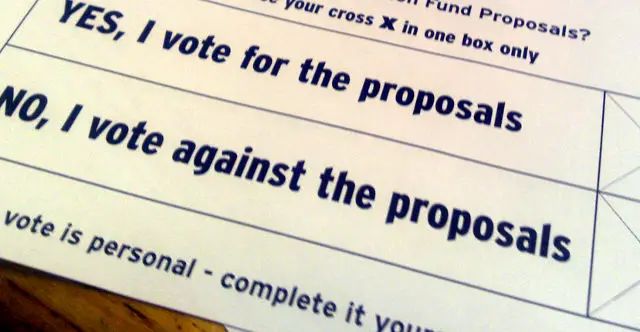Fixed link campaigners, Carl Feeney and Kevin Price, expressed their disappointment at the end of last week after they were told the Isle of Wight council does not intend to hold a Referendum on the matter of a Solent Tunnel fixed link to the mainland.
Building online support
Kevin and Carl, along with a couple of others, have spent the last few weeks gauging public opinion on the fixed link issue.
They organised a petition (which had 3,809 signatures at time of publishing), created a Facebook Group for debate around the issue and have since also released some outline plans for a tunnel under the Solent.
[A campaign against a fixed link has also been running on the Island, which had 1,367 signatures at time of publishing.]
Council can’t hold Referendum
It came as a disappointment to the local businessmen to discover at the end of last week that the council would not be holding a Referendum or Poll on the Isle of Wight.
The news came from a senior officer within the Electoral Services division at the Isle of Wight council, who informed them the council does “not intend to hold a Poll or Referendum on this matter” and that as well as the cost of £150,000, there are other legal obstacles in the way.
In summary, the council can only hold a Poll for something that relates to their function or expenditure on services or something that is within their power.
Clive Joynes, said,
I have to inform you that the Isle of Wight Council do not intend to hold a poll or referendum on this matter, and that there are also a couple of legal obstacles to doing so, as well as the matter of the cost, which would be around £150,000 (were the Council able to conduct a full poll along the lines of a traditional election).
The only statute that could allow the Council to run such a “poll” (not a referendum) is Section 116 of the Local Government Act 2003. Paragraph 1 deals with the matter on which a poll may be taken, and it would be for the authority to decide if a poll on a fixed link fell into one of these categories:
(a) any matter relating to—
(i)services provided in pursuance of the authority’s functions, or
(ii)the authority’s expenditure on such services, or(b) any other matter if it is one relating to the authority’s power under section 2 of the Local Government Act 2000 (c. 22) (authority’s power to promote well-being of its area).
It is doubtful that a poll on a fixed link would fall into any of these categories, as the construction of a fixed link is not within the council’s powers or budget.”
Polls can’t be combined
Mr Joynes went on to say,
“It should also be noted that any polls conducted under Section 116 of the LGA 2003 cannot be combined with other statutory elections or referendums, as the Section 116 poll would be conducted by the Council, whilst the other statutory elections or referendums are conducted by the Returning Officer acting in their personal capacity, and the Council are not able to access the same venues to use them as polling stations.
“Also, whilst the Council can use the Full Register of Electors for such a poll, they are not able to access the List of Absent (Postal & Proxy) Voters, so postal / proxy votes could not be used.
“I know that other authorities that have conducted Section 116 polls (on other matters) have been advised by the Cabinet Office (who now have responsibility for electoral legislation), that these polls cannot be combined.”
Council can’t for forced to hold poll
He finished by saying,
“Finally, unlike a referendum for a change to the form of local authority governance there is no formal petition procedure for local polls, and no mechanism by which a local authority can be forced to hold such a poll.
“There was originally a provision in the Localism Bill which proposed to give power to residents to hold local referendums on any local issue by providing that a referendum must held in a local authority area if 5 per cent of local citizens signed a petition in favour within a six month period; however this was removed from the Bill and does not form part of the Act.”
Image: frankieroberto under CC BY 2.0





